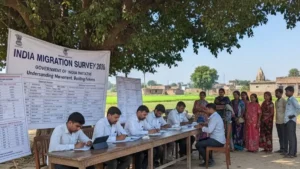The 37th National Games were officially inaugurated by Prime Minister Narendra Modi in a ceremony held in Panaji, Goa.The event witnessed a massive gathering of sports enthusiasts and supporters, who eagerly awaited the commencement of this sporting spectacle. As a symbol of Goa’s culture and identity, Goa Chief Minister Pramod Sawant felicitated the Prime Minister with a traditional Kunbi shawl.
Historic Debut in Goa: 37th National Games Unfold
The 37th edition of the National Games has marked a historic moment as it is being held in Goa for the very first time. The Games, a prestigious sporting event in India, commenced on October 26 and will run until November 9, bringing together more than 10,000 athletes from across the country
Jawaharlal Nehru Stadium: A Sporting Showcase and PM Modi’s Vision
The Jawaharlal Nehru Stadium at Fatorda in South Goa serves as the primary venue for these games, providing a platform for athletes to showcase their skills and talents. During the inauguration, Prime Minister Modi addressed the audience, highlighting the significant changes and developments in India’s sports ecosystem under his administration.
A Transformative Vision for Indian Sports
During his address at the inauguration, Prime Minister Modi emphasized the transformation that India has witnessed in the realm of sports under his leadership. He spoke of a time when sports were considered a mere pastime, and investment in sports was questioned. The Prime Minister proudly asserted, “Our government changed this thinking. We increased the budget. This year’s sports budget is three times higher than nine years ago.”
Empowering India’s Athletes
Prime Minister Modi highlighted the numerous stories of champions emerging from small towns. The government has initiated various schemes, removed roadblocks, and brought about a change in thinking. These efforts aim to support athletes from the grassroots level, offering them a pathway to success on the global stage, including the Olympics.
Building a New Ecosystem for Sports
The Prime Minister discussed various initiatives and programs aimed at transforming India into a sporting powerhouse. He spoke about the Khelo India program and the Target, Olympic, Podium Scheme (TOPS) as critical components of this new ecosystem. These programs focus on identifying and nurturing potential talent at schools, colleges, and universities. The government is also investing significantly in athlete training and nutrition.
A Bright Future for Indian Sports
Prime Minister Modi expressed his wishes for the athletes participating in the National Games, viewing the event as a perfect launch pad for emerging talent. The government’s commitment to sports development extends beyond national boundaries. Prime Minister Modi mentioned his representation of India’s aspirations to host the Youth Olympics in 2030 and the Olympics in 2036, reinforcing the country’s dedication to the global sporting community.




 Kabak Yano from Arunachal Pradesh Conque...
Kabak Yano from Arunachal Pradesh Conque...
 NSO Announces Countrywide Migration Surv...
NSO Announces Countrywide Migration Surv...
 Supreme Court Instructs Centre to Set Up...
Supreme Court Instructs Centre to Set Up...








